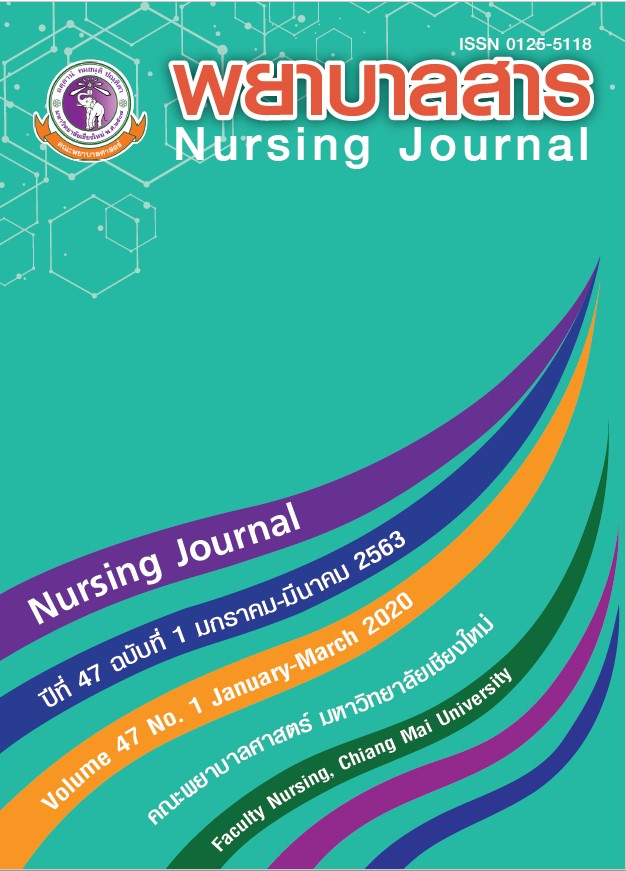Food Consumption Behaviors and Nutritional Status in Dependent Older Persons
Keywords:
Food Consumption Behaviors, Nutritional Status, Dependent Older PersonsAbstract
Malnutrition is a problem found in dependent older persons. This research study aimed to explore food consumption behaviors, nutritional status and to find the relationships among these variables. The sample included 88 dependent older persons residing in the Mueang district of Chiang Mai province, from February to April 2017. Purposive sampling was used. Data were collected using a demographic data recording form, a nutritional recording form, food consumption behaviors of dependent older persons questionnaire tested quality of instrument by using content validity and test-retest reliability and equipment including a skin fold caliper calibrated by using standard block and measuring tape calibrated by using steel measuring tape. Data were analyzed using descriptive statistics and Pearson product-moment correlation statistics.
The results showed that:
- Almost all dependent older persons (94.3%) were found to have a moderate level of food consumption behaviors. Only 2.3% and 3.4% of dependent older persons reported most appropriate and low level of food consumption behaviors.
- Dependent older persons have normal nutritional status (BMI 18.5-22.9 kg/m^2) 37.5% and over nutritional status (BMI > 23 kg/m^2) 32.9 %, while 29.6% were under nutritional status (BMI < 18.5 kg/m^2).
- Food consumption behaviors of dependent older persons were slightly and positively correlated with nutritional status (r = .233 p< .05).
These study results may be beneficial to both health personnel working in hospitals and in the community in promoting nutritional status of dependent older persons by modifying food consumption behaviors for improvement.
References
Bender, D. A. (2009). A dictionary of food and nutrition. New York: Oxford University Press.
Bernstein, M., & Munoz, N. (2019). Nutrition for the older adult (3th ed.). Burlington: Jones &Bartlett Learning.
Burns, N., & Grove, S. K. (2009). The practice of nursing research: Appraisal, synthesis, and generation of evidence (6th ed.). Philadelphia: Elsevier Saunders.
Chumlea, W. C., Guo, S., Roche, A. F., & Steinbaugh, M. L. (1988). Prediction of body weight for the nonambulatory elderly from anthropometry. Journal of the American Dietetic Association, 88 (5), 564-568.
Chumlea, W. C., Roche, A. F., & Steinbaugh, M. L. (1985). Estimating stature from knee height forpersons 60 to 90 years of age. Journal of The American Geriatrics Society, 33 (2), 116-120.doi:10.1111/j.1532-5415.1985.tb02276.x
Department of Health, Ministry of Public Health. (n.d.). Assessment form for the elderly based on the ability to perform activities of daily living (Barthel Activities of Daily Living [ADL]).Retrieved from http://hpc9.anamai.moph.go.th/ewt_dl_link.php?nid=508. (In Thai)
Howarth, N. C., Huang, T. T., Roberts, S. B., Lin, B. H., & McCrory, M. A. (2007). Eating patterns and dietary composition in relation to BMI in younger and older adults. International Journal of Obesity, 31(4), 675-684.
Institute of Geriatric Medicine. (2004). Nutrition assessment guide for elderly. Bangkok: The Agricultural Cooperative Federation of Thailand. (In Thai)
Jirojkul, P. (2005). Nursing research, philosophy, principles and practices(2 nd ed.). Bangkok:Academic Welfare Project, Praboromarajchanok Institute. (In Thai)
Kahn, R. L., Goldfarb, A. I., Pollack, M., & Peck, A. (1960). Br ief objective measures for the determination of mental status in the aged. American Journal of Psychiatry, 117 (4), 326-328.
Ma, G. (2015). Food, eating behavior, and culture in Chinese society. Journal of Ethnic Foods, 2(4), 195-199.
Mattayaruk, S. (2014). Nutritional Status and Factors Related to Nutritional Status in Chronically
Ill Older Persons Attended Outpatient Clinic at A Secondary Hospital (Master’s thesis, Khon Kaen University). (In Thai)
Mann, J., & Truswell, A. S. (Eds.). (2017). Essentials of human nutrition. Oxford: Oxford University Press.
Ministry of Public Health. (2005). Guide for recording and evaluating general food intake and calcium sources. Bangkok: Veterans Relief Organization Printery. (In Thai)
Phantha, A. (2009). Food consumption and nutritional status of the elderly (Master’s thesis, Chiangmai University). (In Thai)
Polit, D. F., & Beck, C. T. (2008). Nursing research: Generating and assessing evidence for nursing practice. Baltimore: Lippincott Williams & Wilkins.
Thai Health Promotion Foundation. (2012). Overweight and obesity. Retrieved from http://www. thaihealth.or.th /Content/20399-overweight and obesity.html. (In Thai)
Thanasansakolpob, S. (2010). Food consumption behavior and health of the elderly in Pathum thani province (Master’s thesis, Kasetsart University). (In Thai)
Sawatphol, C., Pengpinit, T., Senanikorn, A., & Srisuraphol, W. (2015). Care and development elderly by communities in Northeast of Thailand. Humanities and Social Sciences Journal, Ubon Ratchathani Rajabhat University, 7(1), 187-199. (In Thai)
Srithamrongsawat, S., Bundhamcharoen, K., Sasat, S., Odton, P., & Ratkjaroenkhajorn, S. (2009). Projection of demand and expenditure for institutional long term care in Thailand. Nonthaburi: Health Insurance System Research Office.Wade, D. T., & Collin, C. (1988). The Barthel ADL index: A standard measure of physical disability? International Disability Studies, 10 (2), 64-67.
Wannawong, C. (2009). Factors related to food consumption behaviors of the elderly in Mueang district, Yasothon province (Master’s thesis, Ramkhamhaeng University). (In Thai)
World Health Organization. (2002). Keep fit for life:Meeting the nutritional need of older persons. Malta: Malta Interprint Limited.
World Health Organization. (2015). Ageing and health. Retrieved from http://www.who.int/mediacentre/factsheets /fs404/en/
Downloads
Published
How to Cite
Issue
Section
License
บทความที่ได้รับการตีพิมพ์เป็นลิขสิทธิ์ของวารสารพยาบาลสาร
ข้อความที่ปรากฏในบทความแต่ละเรื่องในวารสารวิชาการเล่มนี้เป็นความคิดเห็นส่วนตัวของผู้เขียนแต่ละท่านไม่เกี่ยวข้องกับมหาวิทยาลัยเชียงใหม่ และคณาจารย์ท่านอื่นๆในมหาวิทยาลัยฯ แต่อย่างใด ความรับผิดชอบองค์ประกอบทั้งหมดของบทความแต่ละเรื่องเป็นของผู้เขียนแต่ละท่าน หากมีความผิดพลาดใด ๆ ผู้เขียนแต่ละท่านจะรับผิดชอบบทความของตนเองแต่ผู้เดียว






